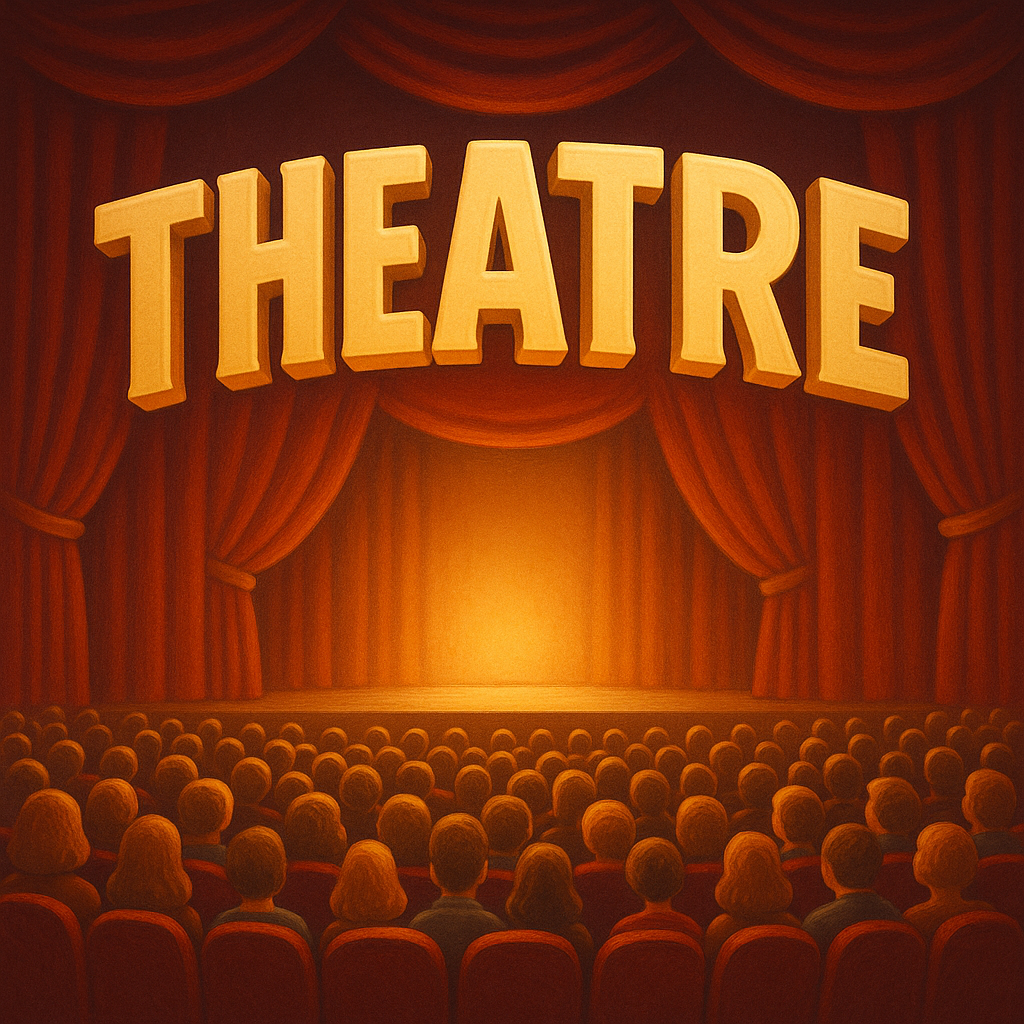Theatre
Definition
Theatre refers to a building or outdoor space for performing dramatic works, or the art of writing, producing, and acting in plays.
Parts of Speech
- Noun
Pronunciation
American English
- IPA Pronunciation: /ˈθiː.ətɚ/ or /ˈθiː.ɪtɚ/
- Respelling: THEE-uh-ter or THEE-i-ter
British English
- IPA Pronunciation: /ˈθɪə.tə/ or /ˈθiː.ə.tə/
- Respelling: THEE-uh-tuh or THEE-uh-tuh
Etymology
The word "theatre" originates from the Greek "theatron," meaning "a place for viewing," derived from "theasthai," meaning "to behold." It passed into Latin as "theatrum" and later into Old French as "theatre," entering English during the Middle Ages.
Derivatives
- Theatrical (adjective)
- Theatrician (noun)
- Theatre-goer (noun)
- Theatrically (adverb)
- Theatricality (noun)
Synonyms
- Playhouse
- Stage
- Auditorium
Antonyms
- None
Usage
The noun "theatre" is used to describe both the physical space for performances and the dramatic art form. For example, "She performed at the national theatre last night." It also refers to the profession, as in "He has dedicated his life to theatre."
Related Terms
- Drama: A composition intended for performance.
- Performance: The act of presenting a play or act to an audience.
- Actor: A person who performs in a play.
Detailed Definitions
Noun
- A building or venue for dramatic performances: Refers to a structure where plays, films, or other performances are held.
- Example: "The theatre was packed with an eager audience."
- The art of writing, producing, and acting in plays: Refers to the creative and cultural field.
- Example: "He has studied theatre at the university for three years."
- A dramatic work or performance: Refers to an individual play or dramatic presentation.
- Example: "The theatre showcased a powerful rendition of Shakespeare’s Hamlet."
- Any place of dramatic events or spectacles: Used metaphorically to describe a place where significant actions unfold.
- Example: "The battlefield became a theatre of war."
theatre



🇨🇳 Chinese (Mandarin)
- 剧院 (theatre as a building)
- IPA Pronunciation: /tɕǔ.jɛ̂n/
- English respelling: jùyuàn
- 戏剧 (theatre as an art)
- IPA Pronunciation: /ɕǐ.tɕǔ/
- English respelling: xìjù
🇮🇳 Hindi
- रंगमंच (theatre as a building)
- IPA Pronunciation: /ɾəŋg.məntʃ/
- English respelling: rangmanch
- नाट्यशास्त्र (theatre as an art)
- IPA Pronunciation: /naːʈjɑː.ʃɑːst̪r/
- English respelling: naatyashastra
🇪🇸 Spanish
- Teatro (theatre as a building)
- IPA Pronunciation: /teˈatɾo/
- English respelling: teatro
- Arte teatral (theatre as an art)
- IPA Pronunciation: /ˈaɾte teaˈtɾal/
- English respelling: arte teatral
🇫🇷 French
- Théâtre (theatre as a building)
- IPA Pronunciation: /teɑtʁ/
- English respelling: théâtre
- Art dramatique (theatre as an art)
- IPA Pronunciation: /aʁ dʁamatik/
- English respelling: art dramatique
🇸🇦 Arabic (Modern Standard Arabic)
- مسرح (theatre as a building)
- IPA Pronunciation: /masrah/
- English respelling: masrah
- فن المسرح (theatre as an art)
- IPA Pronunciation: /fann al-masrah/
- English respelling: fann al-masrah
🇧🇩 Bengali
- থিয়েটার (theatre as a building)
- IPA Pronunciation: /ʈhijeaʈar/
- English respelling: thieatar
- নাট্যশিল্প (theatre as an art)
- IPA Pronunciation: /nat̪ːo ʃilp/
- English respelling: natyoshilpa
🇷🇺 Russian
- Театр (theatre as a building)
- IPA Pronunciation: /tʲɪˈatr/
- English respelling: teatr
- Театральное искусство (theatre as an art)
- IPA Pronunciation: /tʲɪɐˈtralʲnəɪ̯ ɪˈskusstvə/
- English respelling: teatral'noe iskusstvo
🇵🇹 Portuguese
- Teatro (theatre as a building)
- IPA Pronunciation: /tɨˈatɾu/
- English respelling: teatro
- Arte teatral (theatre as an art)
- IPA Pronunciation: /ˈaʁtʃi tɨˈatɾal/
- English respelling: arte teatral
🇮🇩 Indonesian
- Teater (theatre as a building)
- IPA Pronunciation: /tɛatɛr/
- English respelling: teater
- Seni teater (theatre as an art)
- IPA Pronunciation: /sɛni tɛatɛr/
- English respelling: seni teater
🇩🇪 German
- Theater (theatre as a building)
- IPA Pronunciation: /teˈaːtɐ/
- English respelling: theater
- Dramatische Kunst (theatre as an art)
- IPA Pronunciation: /draˈmaːtɪʃə ˈkʊnst/
- English respelling: dramatische Kunst
🇯🇵 Japanese
- 劇場 (theatre as a building)
- IPA Pronunciation: /gekijoː/
- English respelling: gekijō
- 劇芸 (theatre as an art)
- IPA Pronunciation: /gekigei/
- English respelling: gekigei
🇻🇳 Vietnamese
- Nhà hát (theatre as a building)
- IPA Pronunciation: /ɲaː hat̚˧ˀ˦/
- English respelling: nhà hát
- Nghệ thuật kịch (theatre as an art)
- IPA Pronunciation: /ŋhe˧ˀ˦ tʰwəːt̚˧˥ kiʔ˧˥/
- English respelling: nghệ thuật kịch
🇰🇷 Korean
- 극장 (theatre as a building)
- IPA Pronunciation: /k͈ʌktɕ͈aŋ/
- English respelling: geukjang
- 연극 (theatre as an art)
- IPA Pronunciation: /jʌnɡʌk̚/
- English respelling: yeongeuk
🇹🇷 Turkish
- Tiyatro (theatre as a building)
- IPA Pronunciation: /tijatɾo/
- English respelling: tiyatro
- Tiyatro sanatı (theatre as an art)
- IPA Pronunciation: /tijatɾo sanati/
- English respelling: tiyatro sanatı
🇵🇰 Urdu
- تھیٹر (theatre as a building)
- IPA Pronunciation: /θeːʈəɾ/
- English respelling: theatre
- ڈرامائی فن (theatre as an art)
- IPA Pronunciation: /d̪ɾaːmaː.iː fən/
- English respelling: dramaai fun





